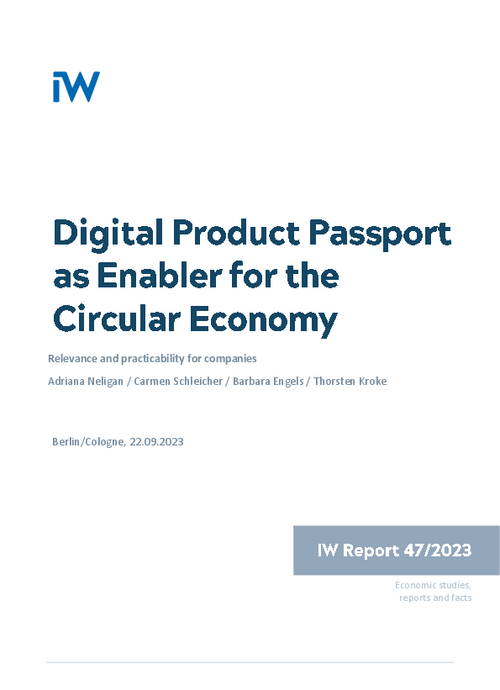In a circular economy, a new understanding of economic activity and an alternative approach to raw materials are required. Resources should be used for as long as possible in order to reduce both the material and energy consumption as well as the waste and emissions of an economic system to a minimum.

Digital Product Passport – Enabler of the Circular Economy

In a circular economy, a new understanding of economic activity and an alternative approach to raw materials are required. Resources should be used for as long as possible in order to reduce both the material and energy consumption as well as the waste and emissions of an economic system to a minimum.
Political relevance of the Digital Product Passport
Politicians are currently discussing a Digital Product Passport (DPP) as a central instrument for building a circular economy. Latter is seen as an important enabler for climate neutrality. Although there is no standardised, cross-sectoral and cross-company product passport system yet, there are already individual solutions for collecting information for certain product groups. To increase transparency throughout the entire product life cycle a DPP shall be made available digitally for all actors. A DPP should include information about the product, such as manufacturer, material, properties, repair, and disposal options. The DPP must fulfil both content-related and technical requirements.
Readiness for the Circular Economy
The topic of the circular economy has not yet arrived on a broad scale in companies. Only a few companies are comprehensively aligning their business model in a circular way, for example by considering the entire product life cycle, optimising the design of products and/or developing new circular business models. At the same time, some relevant product characteristics for a circular economy - such as durability as part of the quality promise "Made in Germany" - are already strongly developed. Other characteristics such as reparability, easy maintenance and refurbishment are not yet in the focus of companies but are key for the transformation to a circular economy.
Digital and Data Readiness
Many companies in Germany do not meet the requirements for implementing the DPP yet. Many companies are not yet sufficiently digitalised and there are large sector differences in the level of digitalisation. Furthermore, many companies do not meet the requirements to manage data efficiently because product data is often still stored in analogue form and many companies do not have data governance, which is the basis for ensuring data quality, data integrity and data security. Many companies do not share data with other companies - mainly due to legal, but also technical barriers.
Structure of a DPP
Ideally, the DPP contains a transparent provision of a unique identification, a precise description of the product and its properties as well as all environmentally relevant information for producers, suppliers, and consumers. The legal content and technical requirements must be complied with and at the same time sector-specific needs must be considered. The DPP should serve as a transport container, follow clear structures and be modular and expandable. A structured and, above all, standardised information collection and transfer is required so that all actors involved can view and supplement relevant information on the product. Standards for the identification, classification and recording of environmentally relevant information are particularly relevant. The ECLASS data standard, with its interoperability, modular system and conformity with standards and global norms, offers many advantages for the development of a DPP.

Digital Product Passport – Enabler of the Circular Economy

More on the topic

Beyond the Pandemic: How Can Countries Pave the Way for a Global Green Recovery?
As governments across the world continue to face the challenge of tackling Covid-19, the current crisis also presents an unprecedented opportunity to reboot global economies in a manner that builds more sustainable, inclusive and resilient societies, in line ...
IW
Sustainability in Supply Chains: An EU-wide Solution Instead of National Rules
The European Parliament outlines its view for a legislative initiative by the EU Commission for binding supply chain due diligence rules. A European solution is welcome as national rules lead to a diversion of trade barriers and distortions of competition in ...
IW